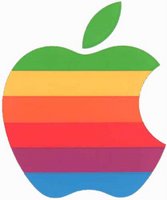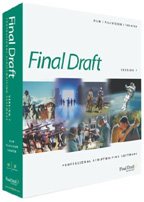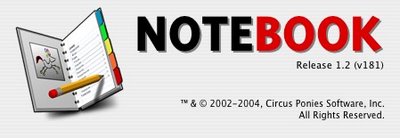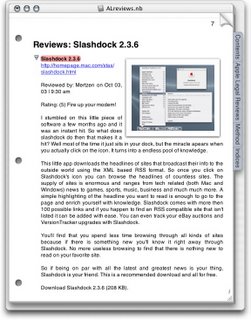OK computer
 Ever since my family's first PC, an Apple IIe, I have been a Mac person. Through the dark days of pizza boxes like the LC II and Performa 6300, to an iMac DV and my new MacBook Pro, I've always liked the way Apples "just work" as compared to Microslop-based products. Even now, as Macs make the move towards running OSX and Windows side-by-side, I can't think of any need that I would have for that capability.
Ever since my family's first PC, an Apple IIe, I have been a Mac person. Through the dark days of pizza boxes like the LC II and Performa 6300, to an iMac DV and my new MacBook Pro, I've always liked the way Apples "just work" as compared to Microslop-based products. Even now, as Macs make the move towards running OSX and Windows side-by-side, I can't think of any need that I would have for that capability.Strictly for screenwriting purposes, though, I think most could get by with v 1.0-level technology. Yes, it's fantastic that the latest software package formats-as-we-go, allowing us to focus on the writing instead of whether the product conforms to some Platonic screenplay ideal. But I wrote the first draft of my first script in trusty old WordPerfect, using "center" and "double indent" keystroke commands, and came up with a fair approximation of the accepted form. Close enough for government work at the time anyway.
 But, to streamline the writing process and feel like I was investing in screenwriting as a profession, I purchased the requisite copy of Final Draft before I left Baltimore. I could have just as easily gone with Movie Magic Screenwriter, the other widely-used program. My impression was that Final Draft was slightly more Mac-friendly and still a bit more the industry standard, although MMS has certainly made substantial inroads to the market. There is also the newer celtx package, which is free and open source but not a stand-alone package (it runs in your Firefox browser).
But, to streamline the writing process and feel like I was investing in screenwriting as a profession, I purchased the requisite copy of Final Draft before I left Baltimore. I could have just as easily gone with Movie Magic Screenwriter, the other widely-used program. My impression was that Final Draft was slightly more Mac-friendly and still a bit more the industry standard, although MMS has certainly made substantial inroads to the market. There is also the newer celtx package, which is free and open source but not a stand-alone package (it runs in your Firefox browser).I can't speak to Final Draft's "tagger" breakdown functions (nothing I've written has even seen the light of California day yet), but for what it does in terms of auto-formatting, it does that reasonably well. The "Smart Type" autofills for locations, characters, parentheticals, etc. become intuitive fairly quickly, which translates into less time thinking and more time typing. (MORE)s and (CONT'D)s can be placed automatically both between page breaks and broken dialogue. Or not, if you don't use them. If you can suppress the knowledge that you're paying a tidy sum for a glorified word processor, it's not too bad.
At the same time, it's not all good either. Apparently, the initial release of FD 7.0 was buggy as heck and crashed frequently. I haven't run into anything fatal yet with mine but even version 7.1.1 still feels unfinished. Scrolling and redrawing is a nightmare. Just moving up or down a few lines on the screen is enough to make you lose track of the cursor or have you wondering where that line of dialogue you just wrote disappeared to. Most likely still there but often it's hard to tell. Additionally, features that are commonplace in many Mac apps, like Spotlight searching, a Dock-style toolbar and the use of unicode special characters, are conspicously absent in the current iteration. Final Draft has announced that a universal binary version will be released sometime this summer. Hopefully, many of the identified issues with version 7 are corrected at that time as well.
One glaring omission is the lack of comprehensive outlining features. Although there is some debate, I think most screenwriters will fall on the side of creating an outline of your story before attempting to write the first draft of a screenplay. So it would make sense that any screenwriting software package would include tools for creating said outline before writing said script. Apparently not. A basic outlining program, OmniOutliner, ships standard with new Macs. It's adequate for that task but another program that I've been demoing the past week does outlining and so much more: NoteBook. I think any Mac writers out there should take a serious look at it.

NoteBook allows you to create (obviously) a digital notebook for any project. Within any notebook, individual pages can be devoted not only to an outline but also to drafts of notes, storage of images, .pdf files, or anything else that can be clipped into your notebook's pages. To-do list pages or items can also be synced with your Mac's iCal. But, for me, it's the clipping service that makes NoteBook most appealing from the screenwriting perspective. Now, as I prepare an outline or rewrite, anything relevant to the script gets put into that project's notebook for future reference. A magazine article on my subject matter, a website that shows the exact location I'm using for a setting, the substance of an e-mail giving me feedback on the first draft for purposes of rewriting. If I can access it on my computer, I can put it in my notebook.
 And to keep your notebook organized, Trapper Keeper style, you can place tabbed dividers between sections of materials. So outlines go in one section, notes in another section, media clippings, correspondence, etc. all in their own place. The total package. Version 2.0 is current at the moment, and version 2.1 is due out sometime in the next month or so. A 30-day demo is downloadable on the Circus Ponies website. And if, like me, you've spent your whole life hearing "Can you get that program on a Mac," you can turn the tables on the Windozers because NoteBook is Apple-only and will apparently remain so for the foreseeable future.
And to keep your notebook organized, Trapper Keeper style, you can place tabbed dividers between sections of materials. So outlines go in one section, notes in another section, media clippings, correspondence, etc. all in their own place. The total package. Version 2.0 is current at the moment, and version 2.1 is due out sometime in the next month or so. A 30-day demo is downloadable on the Circus Ponies website. And if, like me, you've spent your whole life hearing "Can you get that program on a Mac," you can turn the tables on the Windozers because NoteBook is Apple-only and will apparently remain so for the foreseeable future.[UPDATE]
I am apprised of a new potential Mac-based alternative to Final Draft and MMS. Montage from Mariner Software promises to do all the usual script formatting but via universal binary and native Cocoa, i.e., made by and for Macs from the base up. And will import Final Draft documents, so nothing lost in switching. And synced to Address Book for easy mailing of files to all your contacts at once. And built-in outlining features apparently. And only $150 when it goes on sale. That's what is represented on the website at least. Unfortunately, it's still in beta and doesn't appear to be downloadable in a trial version anywhere that I could find on the website. But I will definitely keep my eye on this, especially if the universal binary update for Final Draft is not a significant step forward.

0 Comments:
Post a Comment
<< Home